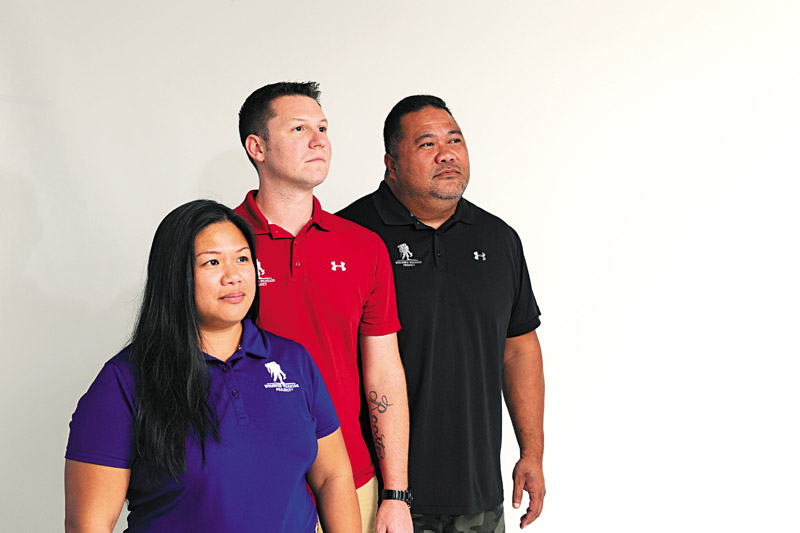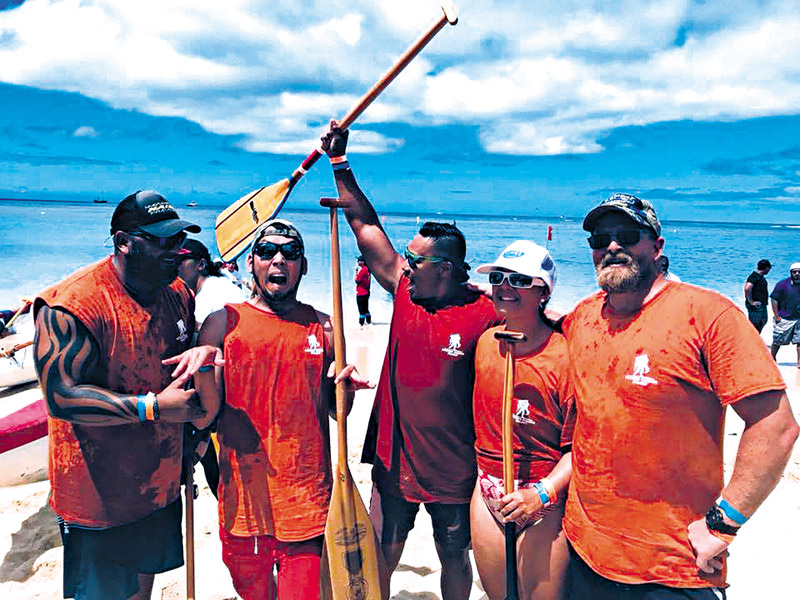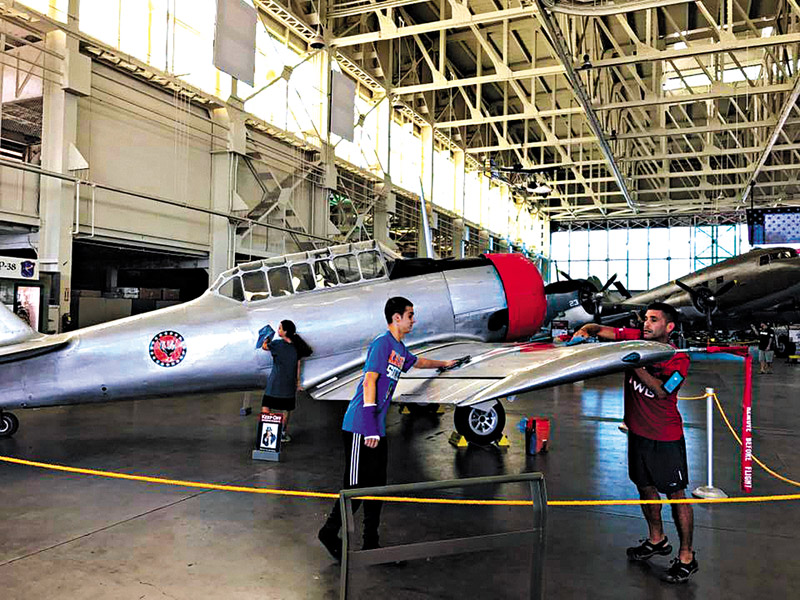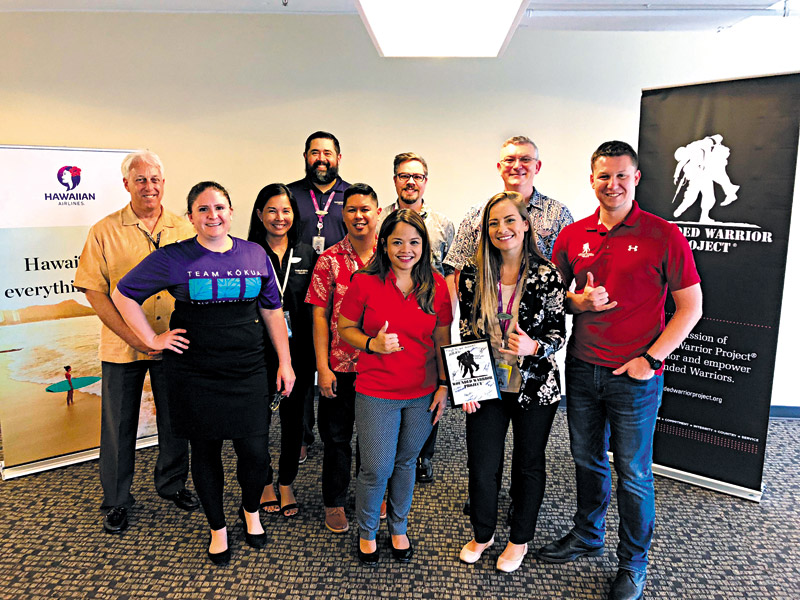Way Of The Warrior

Carmela Guerrero, Ron Wuestefeld and Ionatana Ala
Wounded Warrior Project is focused on helping America’s post-9/11 combat veterans live their best lives — one warrior at a time.
It is easy to proclaim support for the men and women who serve in America’s armed forces. Veterans Day passes with patriotic parades, sales and discounts at various businesses, and platitudes from politicians.
But those gestures — well intended as they are — miss the crux of the problem.
“There’s a thing of people saying, ‘Hey, welcome back, thank you for your service,’ but I think (people need) just a better understanding of the challenges (veterans) are facing,” says Fitha Dahana-Ellis, Warriors to Work specialist with Wounded Warrior Project Hawai‘i.
The transition between military and civilian life is not an easy one — and it’s even more difficult for those who are also struggling with injuries, both visible and invisible.
Thankfully, Wounded Warrior Project is there to fill that gap as best as it can. The nonprofit was founded 15 years ago to serve post-9/11 veterans who have been injured during their service in any way they need to achieve their highest ambitions, as well as their families.
In the four years since its inception, the Hawai‘i chapter has registered 2,000 warriors and their families, and put on 200 events that have reached 9,000 people.
And their work goes on.

Wounded Warrior Project Hawai‘i has held a number of community events, such as its annual Na Koa Wounded Warrior Canoe Regatta.PHOTOS COURTESY WOUNDED WARRIOR PROJECT HAWAI‘I
Retired Sgt. Ron Wuestefeld likens leaving the Army as a kind of “prison gate concept.” “When you get out, the resources are there, but they’re not waiting for you outside, kind of like a prisoner getting out — there’s nobody to pick them up.”
After serving in the Philippines and multiple tours in Iraq between 2007 and 2011, and acquiring a laundry list of injuries that include 70 percent posttraumatic stress disorder and at least three concussions, Wuestefeld found himself adrift when he returned to Hawai‘i.
“I couldn’t find employment,” he says. “I was going, putting my résumé and application out there for other companies and everything. It got to the point where I was even looking at just trying to be a dishwasher to just get a job out there, so I had something besides the military.
“They wouldn’t even hire me. They asked if I had ever been deployed, and I told them yes … and the guy just straight up said, ‘Well, I won’t hire you because I’m afraid you might have PTSD, and I don’t know what you’ll do.”

A community service event cleaning planes at Pearl Harbor Aviation Museum.
Luckily, he met Dahana-Ellis through a Wounded Warrior Project event, and everything changed. She explained what was wrong with his résumé, drilled him during dozens of practice interviews and followed up constantly — to the point that, when the nonprofit had a job opening for an outreach coordinator, she pushed him to apply.
Now, Wuestefeld works with Dahana-Ellis and other staffers to ensure that Wounded Warrior Project’s 20 free programs are available to anyone who might need them.
“Wounded Warrior Project has allowed me to … take my resources and actually find these veterans that are transitioning out to keep that (prison gate) concept from happening to them,” Wuestefeld says.
What those resources consist of may surprise those who associate Wounded Warrior Project only with its more visible beach days or athletic events.
“We really focus on the mental health, the physical health, as well as the economic health, if you will,” says Dahana-Ellis, herself a wife to a retired soldier.
“Our big thing is that we want to get the veterans out there in the community again.”

A hiring event with Hawaiian Airlines
Need to understand how to navigate the complicated world of Veteran Affairs? Someone can help. Need nutrition coaching? There’s a program for that. Need relationship counseling? Project Odyssey will send you on a multiday seminar based on outdoor recreation therapy. Need to learn how to update your résumé for a civilian job? Dahana-Ellis herself will work with warriors on that. Spouses or families of warriors also have plenty of resources to take advantage of.
“Wounded Warrior Project is always there to help you do what you want to do in life,” says retired Army Sgt. Ionatana Ala, who was injured in Iraq in 2005, and currently serves as a peer mentor and facilitator with the nonprofit. “If you want to fix your relationship, if you want to get a job, if you want to get out of the house — we pretty much cover it all.”
What really sets Wounded Warrior Project apart is its focus on the individual.
“When I got out, my husband stayed in,” says Carmela Guerrero, a retired Navy hospital corpsman, third class, married to a Navy hospital corpsman chief petty officer.” I had to really think about how I can help him. He tells me he doesn’t have any effects from the places he’s gone to because he doesn’t want to talk about it, but I know when he’s having nightmares.
“It’s like, what am I supposed to do?”
Wounded Warrior Project, she says, showed her that other people did understand how she felt. Guerrero was not alone. There were people she could talk to, as well as those who were willing to engage with her husband at his pace.
Everyone is different, and everyone has different needs. Wounded Warrior Project staff and volunteers understand that, and pride themselves on their case-by-case focus. No one is a statistic.
In Hawai‘i, the community is small enough that they see themselves as a family.
Ala, who facilitates a peer support group at O‘ahu Veterans Center, says everyone handles leaving the military differently.
Some vets, he says, are keen to jump back into work and civilian life, but are ill-equipped to handle the culture shock, as it were. Others are reluctant
to leave the house and prefer to stay home “drinking beer at 2 in the afternoon, playing PlayStation, surfing YouTube” (as Wuestefeld puts it).
“That’s why I wanted to be a peer mentor, because the struggles, the lost look you have when you first come out — you don’t know where to go, who to see, that kind of thing,” Ala says.
These are the kinds of issues that don’t occur to civilians — no one thinks about how the military experience changes you in ways that are deeper than a uniform. No one thinks about what happens when the troops come home and need to reintegrate into a world that fundamentally is unaware of what they have endured.
“Give us a chance,” Ala says with a laugh. “You’d be surprised at what we can do.”
Until society catches up, Wounded Warrior Project will continue its work to improve the lives of America’s armed forces when they return home.
Employers, nonprofits and individuals interested in partnering with Wounded Warrior Project Hawai‘i should contact Dahana-Ellis at fdahanaellis@woundedwarriorproject.org or Wuestefeld at rwuestefeld@woundedwarriorproject.org. For more information on the nonprofit, visit woundedwarriorproject.org.





